
zotero-mcp
Zotero MCP: Connects your Zotero research library with Claude and other AI assistants via the Model Context Protocol to discuss papers, get summaries, analyze citations, and more.
Stars: 513
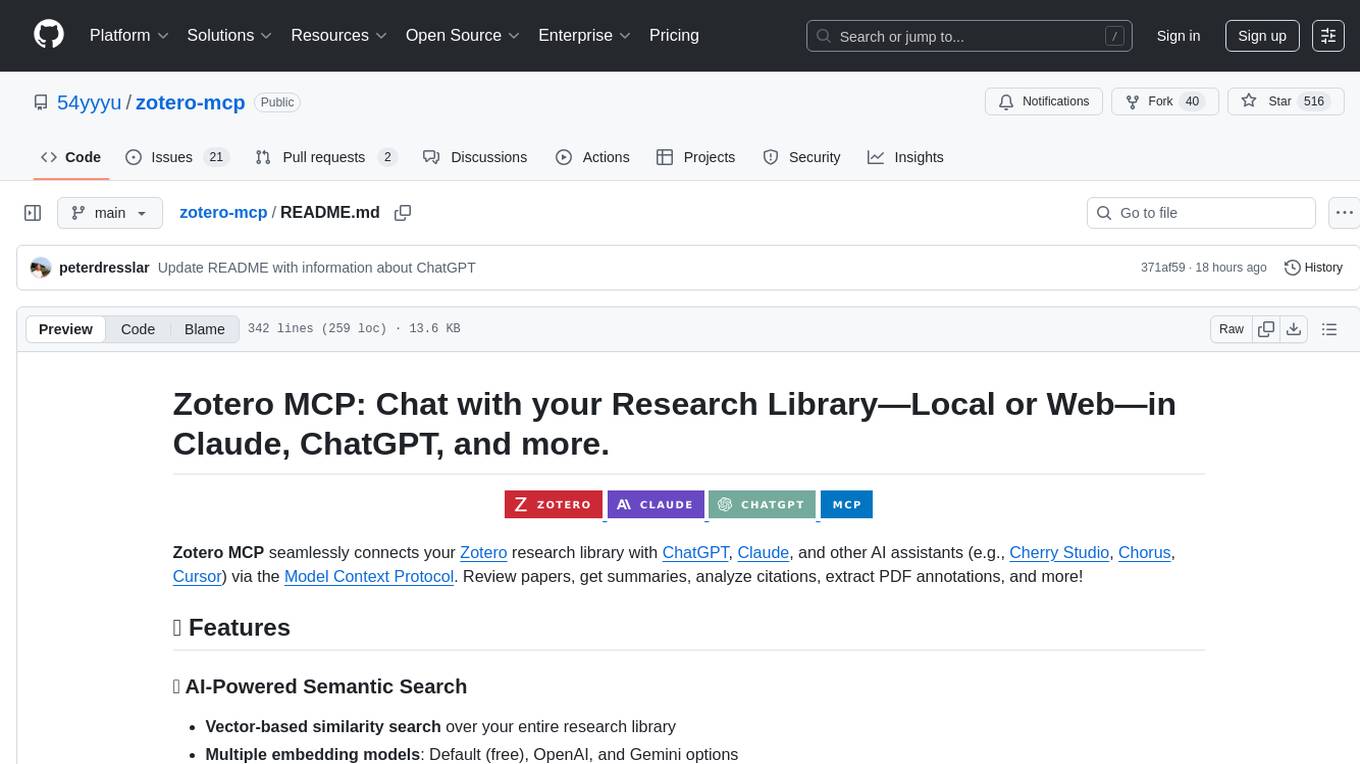
Zotero MCP seamlessly connects your Zotero research library with AI assistants like ChatGPT and Claude via the Model Context Protocol. It offers AI-powered semantic search, access to library content, PDF annotation extraction, and easy updates. Users can search their library, analyze citations, and get summaries, making it ideal for research tasks. The tool supports multiple embedding models, intelligent search results, and flexible access methods for both local and remote collaboration. With advanced features like semantic search and PDF annotation extraction, Zotero MCP enhances research efficiency and organization.
README:
Zotero MCP seamlessly connects your Zotero research library with ChatGPT, Claude, and other AI assistants (e.g., Cherry Studio, Chorus, Cursor) via the Model Context Protocol. Review papers, get summaries, analyze citations, extract PDF annotations, and more!
- Vector-based similarity search over your entire research library
- Multiple embedding models: Default (free), OpenAI, and Gemini options
- Intelligent results with similarity scores and contextual matching
- Auto-updating database with configurable sync schedules
- Find papers, articles, and books by title, author, or content
- Perform complex searches with multiple criteria
- Browse collections, tags, and recent additions
- NEW: Semantic search for conceptual and topic-based discovery
- Retrieve detailed metadata for any item
- Get full text content (when available)
- Access attachments, notes, and child items
- Extract and search PDF annotations directly
- Access Zotero's native annotations
- Create and update notes and annotations
- Smart update system that detects your installation method (uv, pip, conda, pipx)
- Configuration preservation - all settings maintained during updates
- Version checking and automatic update notifications
- Local method for offline access (no API key needed)
- Web API for cloud library access
- Perfect for both local research and remote collaboration
uv tool install "git+https://github.com/54yyyu/zotero-mcp.git"
zotero-mcp setup # Auto-configure (Claude Desktop supported)pip install git+https://github.com/54yyyu/zotero-mcp.git
zotero-mcp setup # Auto-configure (Claude Desktop supported)To install Zotero MCP via Smithery for Claude Desktop:
npx -y @smithery/cli install @54yyyu/zotero-mcp --client claudeKeep zotero-mcp up to date with the smart update command:
# Check for updates
zotero-mcp update --check-only
# Update to latest version (preserves all configurations)
zotero-mcp updateZotero MCP now includes powerful AI-powered semantic search capabilities that let you find research based on concepts and meaning, not just keywords.
During setup or separately, configure semantic search:
# Configure during initial setup (recommended)
zotero-mcp setup
# Or configure semantic search separately
zotero-mcp setup --semantic-config-onlyAvailable Embedding Models:
- Default (all-MiniLM-L6-v2): Free, runs locally, good for most use cases
-
OpenAI: Better quality, requires API key (
text-embedding-3-smallortext-embedding-3-large) -
Gemini: Better quality, requires API key (
models/text-embedding-004or experimental models)
Update Frequency Options:
-
Manual: Update only when you run
zotero-mcp update-db - Auto on startup: Update database every time the server starts
- Daily: Update once per day automatically
- Every N days: Set custom interval
After setup, initialize your search database:
# Build the semantic search database (fast, metadata-only)
zotero-mcp update-db
# Build with full-text extraction (slower, more comprehensive)
zotero-mcp update-db --fulltext
# Check database status
zotero-mcp db-statusExample Semantic Queries in your AI assistant:
- "Find research similar to machine learning concepts in neuroscience"
- "Papers that discuss climate change impacts on agriculture"
- "Research related to quantum computing applications"
- "Studies about social media influence on mental health"
- "Find papers conceptually similar to this abstract: [paste abstract]"
The semantic search provides similarity scores and finds papers based on conceptual understanding, not just keyword matching.
Full documentation is available at Zotero MCP docs.
Requirements
- Python 3.10+
- Zotero 7+ (for local API with full-text access)
- An MCP-compatible client (e.g., Claude Desktop, ChatGPT Developer Mode, Cherry Studio, Chorus)
For ChatGPT setup: see the Getting Started guide.
After installation, either:
-
Auto-configure (recommended):
zotero-mcp setup
-
Manual configuration: Add to your
claude_desktop_config.json:{ "mcpServers": { "zotero": { "command": "zotero-mcp", "env": { "ZOTERO_LOCAL": "true" } } } }
- Start Zotero desktop (make sure local API is enabled in preferences)
- Launch Claude Desktop
- Access the Zotero-MCP tool through Claude Desktop's tools interface
Example prompts:
- "Search my library for papers on machine learning"
- "Find recent articles I've added about climate change"
- "Summarize the key findings from my paper on quantum computing"
- "Extract all PDF annotations from my paper on neural networks"
- "Search my notes and annotations for mentions of 'reinforcement learning'"
- "Show me papers tagged '#Arm' excluding those with '#Crypt' in my library"
- "Search for papers on operating system with tag '#Arm'"
- "Export the BibTeX citation for papers on machine learning"
- "Find papers conceptually similar to deep learning in computer vision" (semantic search)
- "Research that relates to the intersection of AI and healthcare" (semantic search)
- "Papers that discuss topics similar to this abstract: [paste text]" (semantic search)
Go to Settings -> MCP Servers -> Edit MCP Configuration, and add the following:
{
"mcpServers": {
"zotero": {
"name": "zotero",
"type": "stdio",
"isActive": true,
"command": "zotero-mcp",
"args": [],
"env": {
"ZOTERO_LOCAL": "true"
}
}
}
}Then click "Save".
Cherry Studio also provides a visual configuration method for general settings and tools selection.
For accessing your Zotero library via the web API (useful for remote setups):
zotero-mcp setup --no-local --api-key YOUR_API_KEY --library-id YOUR_LIBRARY_IDZotero Connection:
-
ZOTERO_LOCAL=true: Use the local Zotero API (default: false) -
ZOTERO_API_KEY: Your Zotero API key (for web API) -
ZOTERO_LIBRARY_ID: Your Zotero library ID (for web API) -
ZOTERO_LIBRARY_TYPE: The type of library (user or group, default: user)
Semantic Search:
-
ZOTERO_EMBEDDING_MODEL: Embedding model to use (default, openai, gemini) -
OPENAI_API_KEY: Your OpenAI API key (for OpenAI embeddings) -
OPENAI_EMBEDDING_MODEL: OpenAI model name (text-embedding-3-small, text-embedding-3-large) -
GEMINI_API_KEY: Your Gemini API key (for Gemini embeddings) -
GEMINI_EMBEDDING_MODEL: Gemini model name (models/text-embedding-004, etc.)
# Run the server directly
zotero-mcp serve
# Specify transport method
zotero-mcp serve --transport stdio|streamable-http|sse
# Setup and configuration
zotero-mcp setup --help # Get help on setup options
zotero-mcp setup --semantic-config-only # Configure only semantic search
zotero-mcp setup-info # Show installation path and config info for MCP clients
# Updates and maintenance
zotero-mcp update # Update to latest version
zotero-mcp update --check-only # Check for updates without installing
zotero-mcp update --force # Force update even if up to date
# Semantic search database management
zotero-mcp update-db # Update semantic search database (fast, metadata-only)
zotero-mcp update-db --fulltext # Update with full-text extraction (comprehensive but slower)
zotero-mcp update-db --force-rebuild # Force complete database rebuild
zotero-mcp update-db --fulltext --force-rebuild # Rebuild with full-text extraction
zotero-mcp db-status # Show database status and info
# General
zotero-mcp version # Show current versionZotero MCP includes advanced PDF annotation extraction capabilities:
- Direct PDF Processing: Extract annotations directly from PDF files, even if they're not yet indexed by Zotero
- Enhanced Search: Search through PDF annotations and comments
- Image Annotation Support: Extract image annotations from PDFs
- Seamless Integration: Works alongside Zotero's native annotation system
For optimal annotation extraction, it is highly recommended to install the Better BibTeX plugin for Zotero. The annotation-related functions have been primarily tested with this plugin and provide enhanced functionality when it's available.
The first time you use PDF annotation features, the necessary tools will be automatically downloaded.
-
zotero_semantic_search: AI-powered similarity search with embedding models -
zotero_update_search_database: Manually update the semantic search database -
zotero_get_search_database_status: Check database status and configuration
-
zotero_search_items: Search your library by keywords -
zotero_advanced_search: Perform complex searches with multiple criteria -
zotero_get_collections: List collections -
zotero_get_collection_items: Get items in a collection -
zotero_get_tags: List all tags -
zotero_get_recent: Get recently added items -
zotero_search_by_tag: Search your library using custom tag filters
-
zotero_get_item_metadata: Get detailed metadata (supports BibTeX export viaformat="bibtex") -
zotero_get_item_fulltext: Get full text content -
zotero_get_item_children: Get attachments and notes
-
zotero_get_annotations: Get annotations (including direct PDF extraction) -
zotero_get_notes: Retrieve notes from your Zotero library -
zotero_search_notes: Search in notes and annotations (including PDF-extracted) -
zotero_create_note: Create a new note for an item (beta feature)
-
No results found: Ensure Zotero is running and the local API is enabled. You need to toggle on
Allow other applications on this computer to communicate with Zoteroin Zotero preferences. - Can't connect to library: Check your API key and library ID if using web API
- Full text not available: Make sure you're using Zotero 7+ for local full-text access
- Local library limitations: Some functionality (tagging, library modifications) may not work with local JS API. Consider using web library setup for full functionality. (See the docs for more info.)
-
Installation/search option switching issues: Database problems from changing install methods or search options can often be resolved with
zotero-mcp update-db --force-rebuild
-
"Missing required environment variables" when running update-db: Run
zotero-mcp setupto configure your environment, or the CLI will automatically load settings from your MCP client config (e.g., Claude Desktop) - ChromaDB warnings: Update to the latest version - deprecation warnings have been fixed
-
Database update takes long: By default,
update-dbis fast (metadata-only). For comprehensive indexing with full-text, use--fulltextflag. Use--limitparameter for testing:zotero-mcp update-db --limit 100 -
Semantic search returns no results: Ensure the database is initialized with
zotero-mcp update-dband check status withzotero-mcp db-status -
Limited search quality: For better semantic search results, use
zotero-mcp update-db --fulltextto index full-text content (requires local Zotero setup) - OpenAI/Gemini API errors: Verify your API keys are correctly set and have sufficient credits/quota
-
Update command fails: Check your internet connection and try
zotero-mcp update --force -
Configuration lost after update: The update process preserves configs automatically, but check
~/.config/zotero-mcp/for backup files
MIT
For Tasks:
Click tags to check more tools for each tasksFor Jobs:
Alternative AI tools for zotero-mcp
Similar Open Source Tools

zotero-mcp
Zotero MCP seamlessly connects your Zotero research library with AI assistants like ChatGPT and Claude via the Model Context Protocol. It offers AI-powered semantic search, access to library content, PDF annotation extraction, and easy updates. Users can search their library, analyze citations, and get summaries, making it ideal for research tasks. The tool supports multiple embedding models, intelligent search results, and flexible access methods for both local and remote collaboration. With advanced features like semantic search and PDF annotation extraction, Zotero MCP enhances research efficiency and organization.
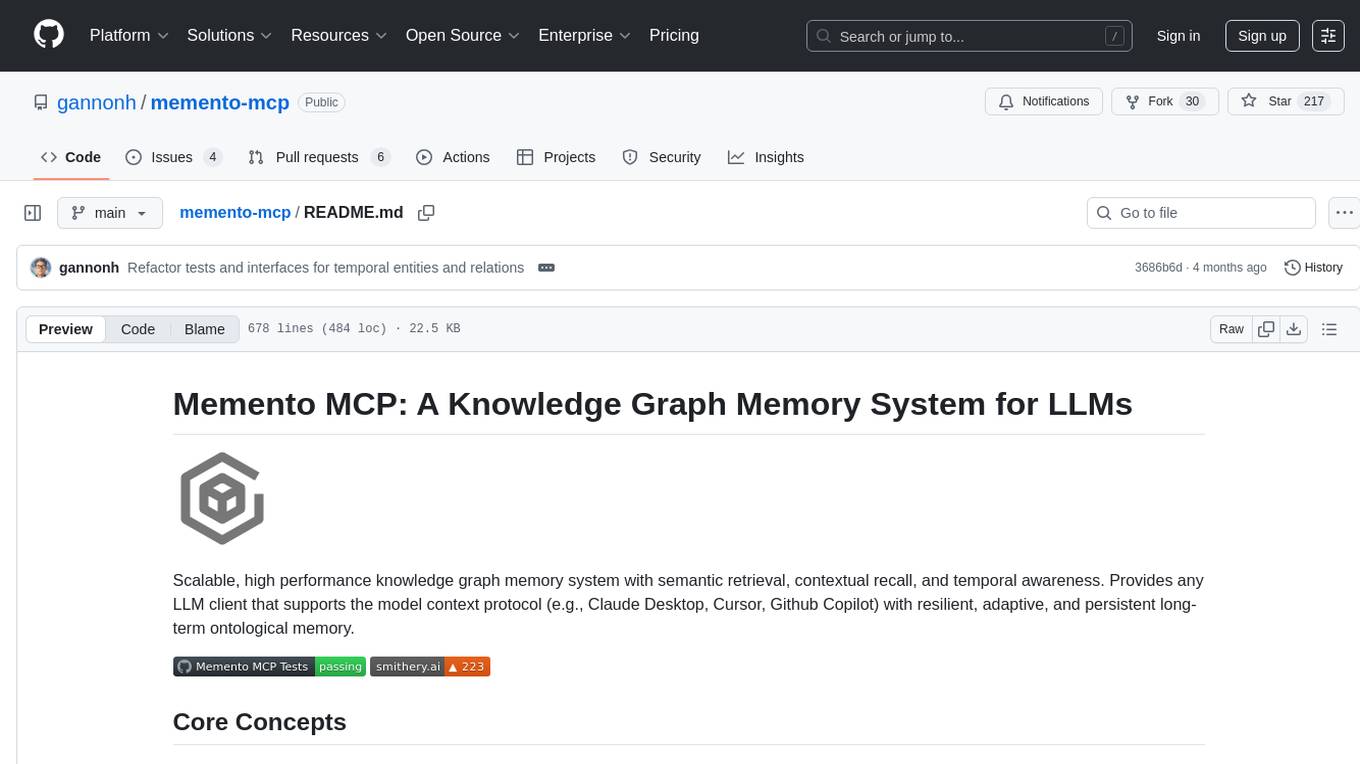
memento-mcp
Memento MCP is a scalable, high-performance knowledge graph memory system designed for LLMs. It offers semantic retrieval, contextual recall, and temporal awareness to any LLM client supporting the model context protocol. The system is built on core concepts like entities and relations, utilizing Neo4j as its storage backend for unified graph and vector search capabilities. With advanced features such as semantic search, temporal awareness, confidence decay, and rich metadata support, Memento MCP provides a robust solution for managing knowledge graphs efficiently and effectively.
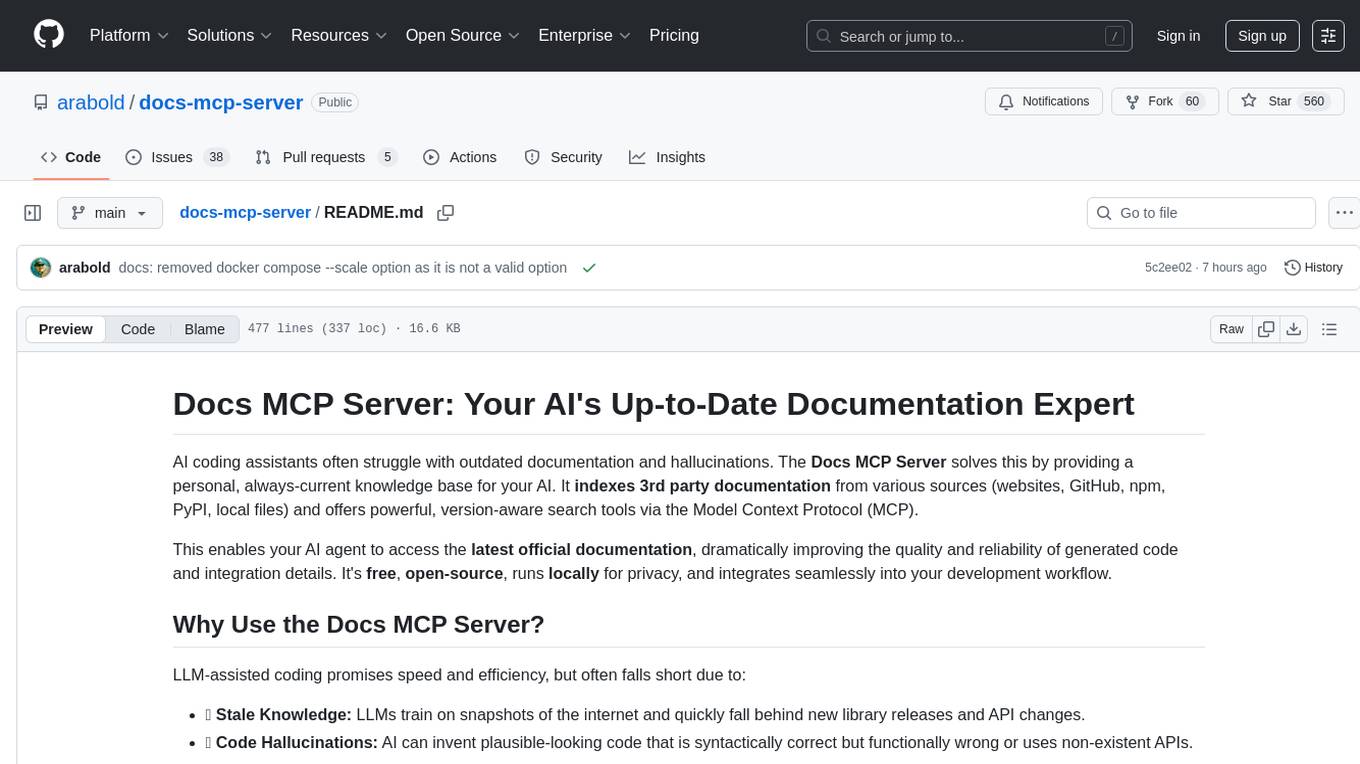
docs-mcp-server
The docs-mcp-server repository contains the server-side code for the documentation management system. It provides functionalities for managing, storing, and retrieving documentation files. Users can upload, update, and delete documents through the server. The server also supports user authentication and authorization to ensure secure access to the documentation system. Additionally, the server includes APIs for integrating with other systems and tools, making it a versatile solution for managing documentation in various projects and organizations.
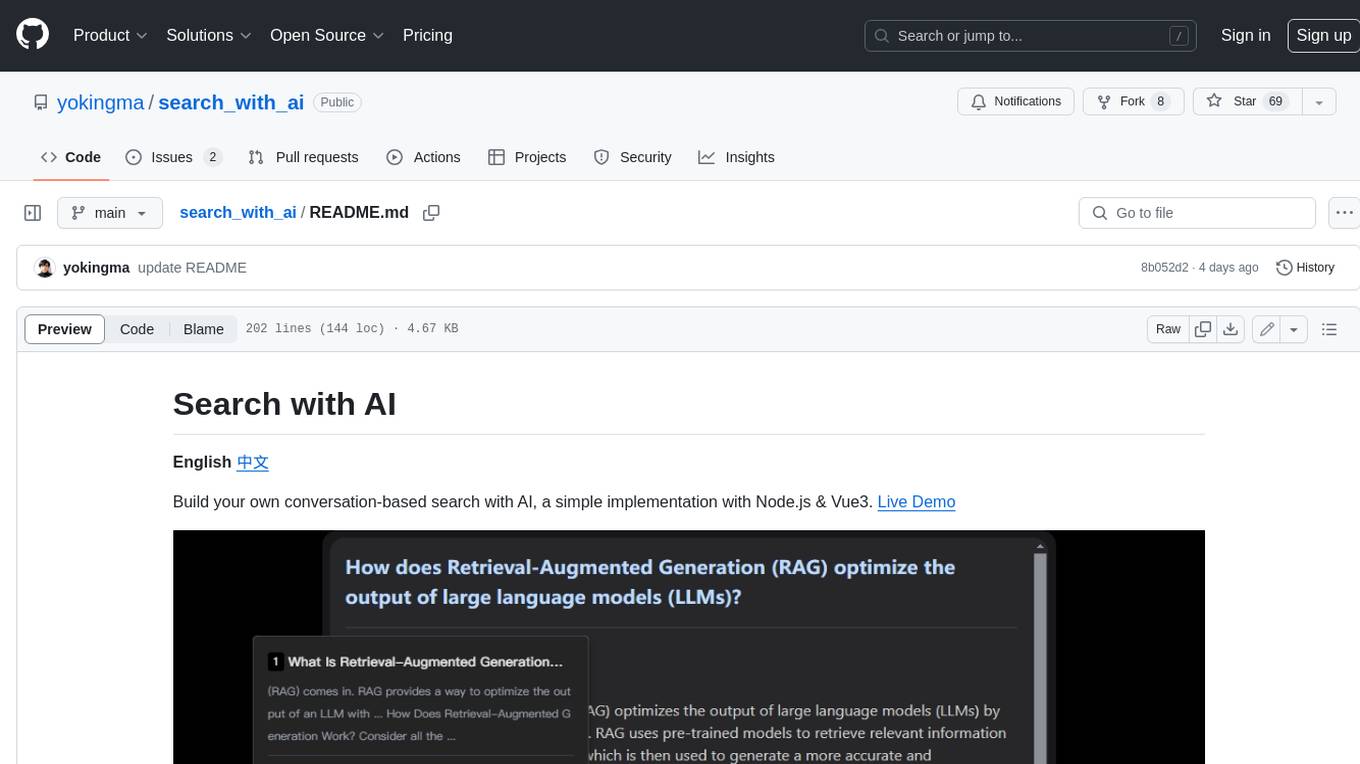
search_with_ai
Build your own conversation-based search with AI, a simple implementation with Node.js & Vue3. Live Demo Features: * Built-in support for LLM: OpenAI, Google, Lepton, Ollama(Free) * Built-in support for search engine: Bing, Sogou, Google, SearXNG(Free) * Customizable pretty UI interface * Support dark mode * Support mobile display * Support local LLM with Ollama * Support i18n * Support Continue Q&A with contexts.
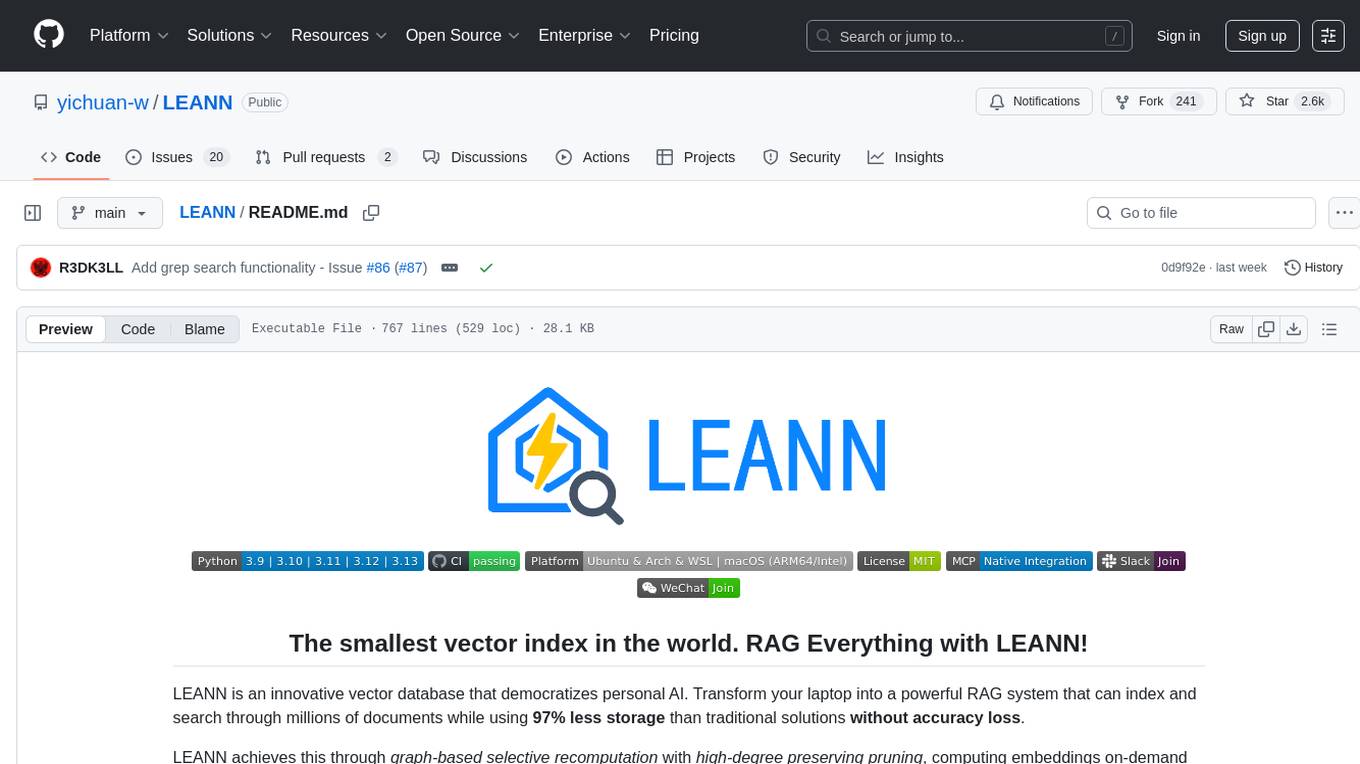
LEANN
LEANN is an innovative vector database that democratizes personal AI, transforming your laptop into a powerful RAG system that can index and search through millions of documents using 97% less storage than traditional solutions without accuracy loss. It achieves this through graph-based selective recomputation and high-degree preserving pruning, computing embeddings on-demand instead of storing them all. LEANN allows semantic search of file system, emails, browser history, chat history, codebase, or external knowledge bases on your laptop with zero cloud costs and complete privacy. It is a drop-in semantic search MCP service fully compatible with Claude Code, enabling intelligent retrieval without changing your workflow.
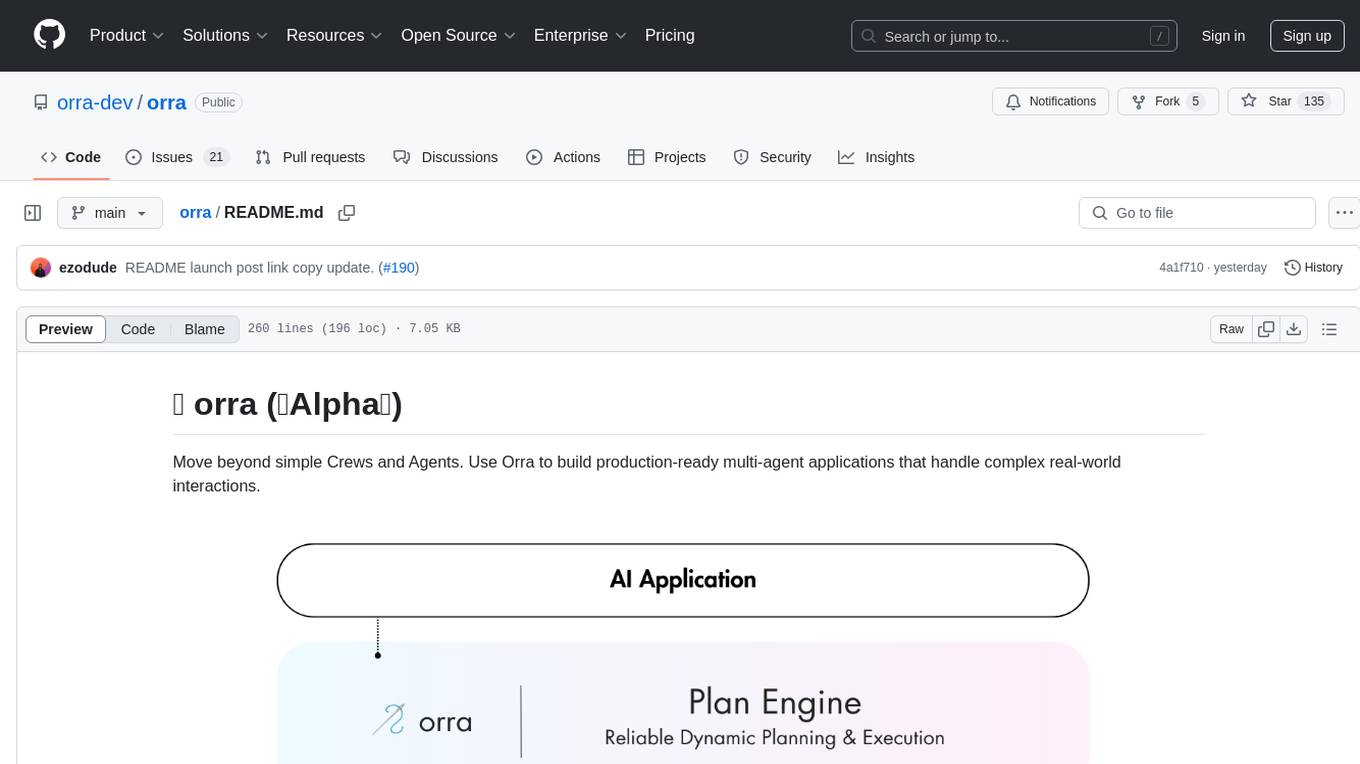
orra
Orra is a tool for building production-ready multi-agent applications that handle complex real-world interactions. It coordinates tasks across existing stack, agents, and tools run as services using intelligent reasoning. With features like smart pre-evaluated execution plans, domain grounding, durable execution, and automatic service health monitoring, Orra enables users to go fast with tools as services and revert state to handle failures. It provides real-time status tracking and webhook result delivery, making it ideal for developers looking to move beyond simple crews and agents.
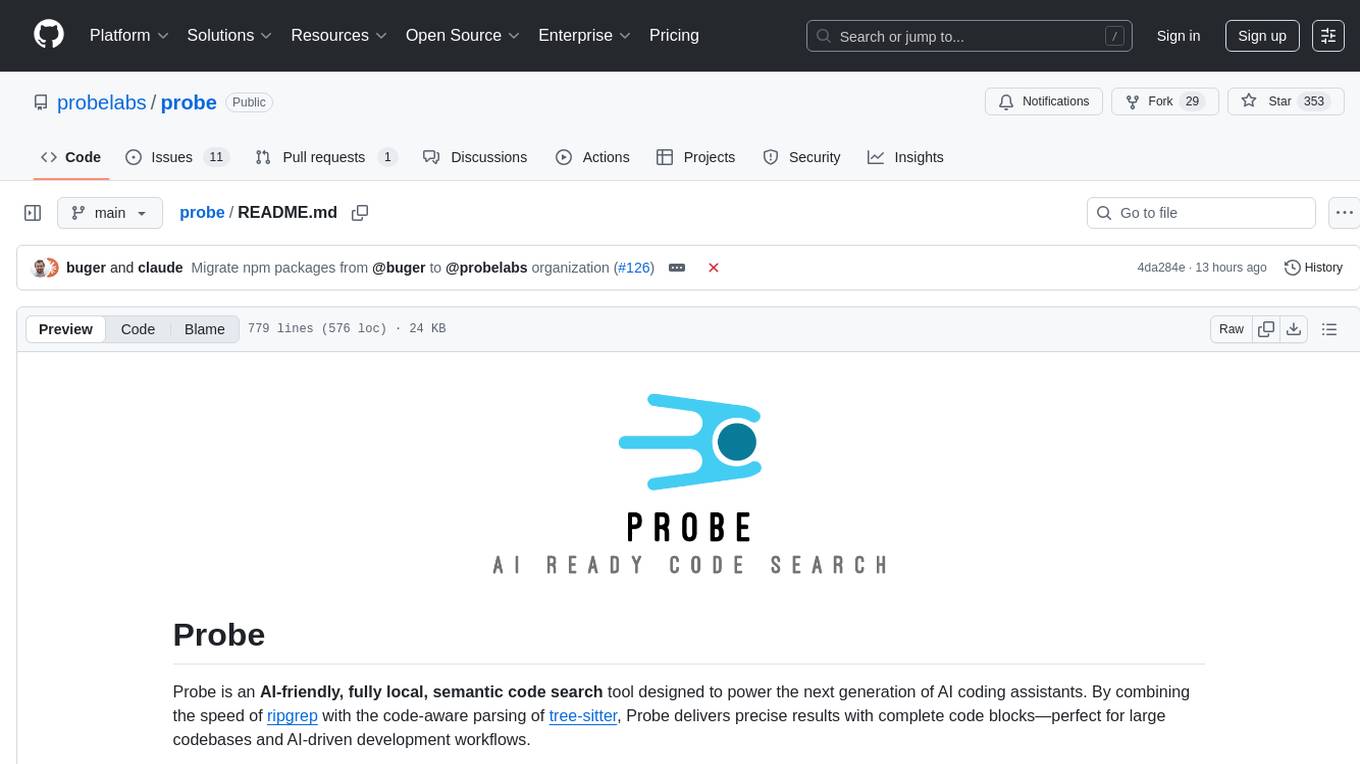
probe
Probe is an AI-friendly, fully local, semantic code search tool designed to power the next generation of AI coding assistants. It combines the speed of ripgrep with the code-aware parsing of tree-sitter to deliver precise results with complete code blocks, making it perfect for large codebases and AI-driven development workflows. Probe supports various features like AI-friendly code extraction, fully local operation without external APIs, fast scanning of large codebases, accurate code structure parsing, re-rankers and NLP methods for better search results, multi-language support, interactive AI chat mode, and flexibility to run as a CLI tool, MCP server, or interactive AI chat.
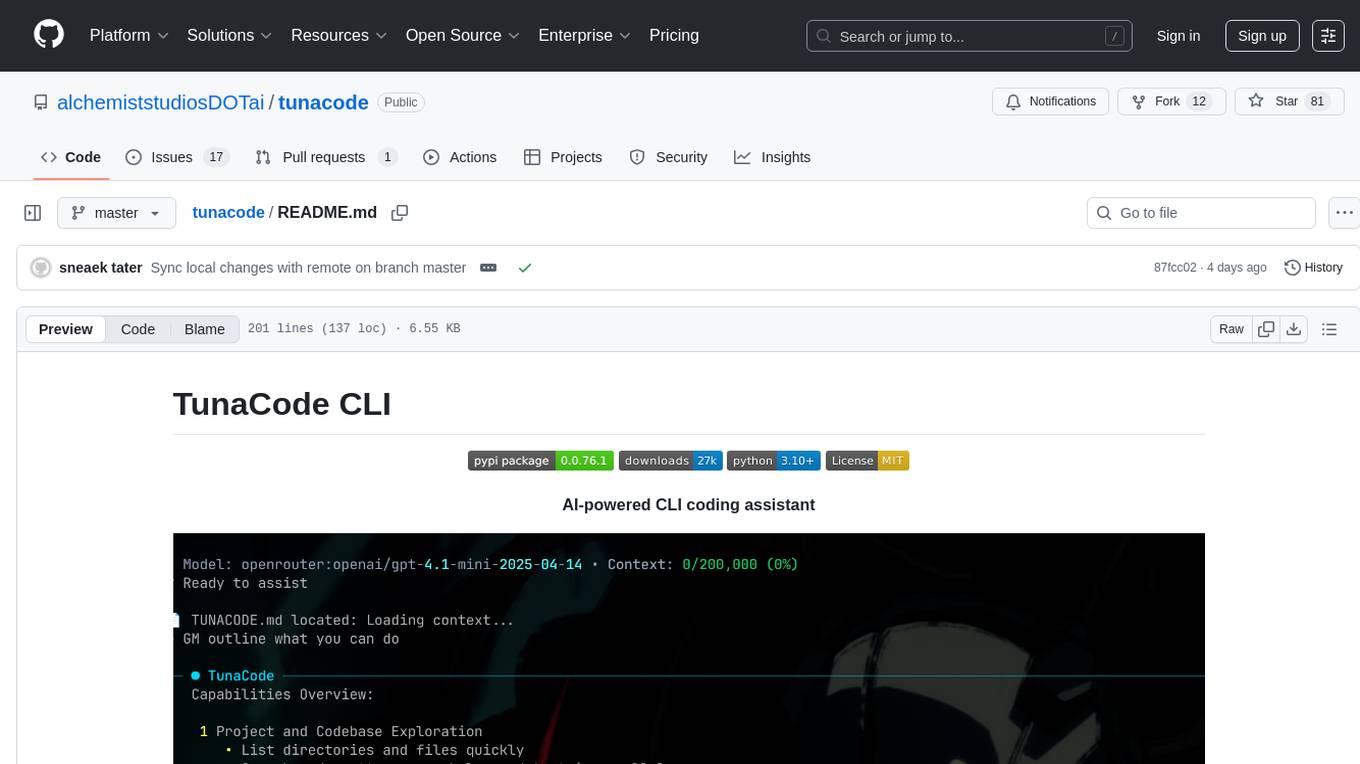
tunacode
TunaCode CLI is an AI-powered coding assistant that provides a command-line interface for developers to enhance their coding experience. It offers features like model selection, parallel execution for faster file operations, and various commands for code management. The tool aims to improve coding efficiency and provide a seamless coding environment for developers.
ck
ck (seek) is a semantic grep tool that finds code by meaning, not just keywords. It replaces traditional grep by understanding the user's search intent. It allows users to search for code based on concepts like 'error handling' and retrieves relevant code even if the exact keywords are not present. ck offers semantic search, drop-in grep compatibility, hybrid search combining keyword precision with semantic understanding, agent-friendly output in JSONL format, smart file filtering, and various advanced features. It supports multiple search modes, relevance scoring, top-K results, and smart exclusions. Users can index projects for semantic search, choose embedding models, and search specific files or directories. The tool is designed to improve code search efficiency and accuracy for developers and AI agents.
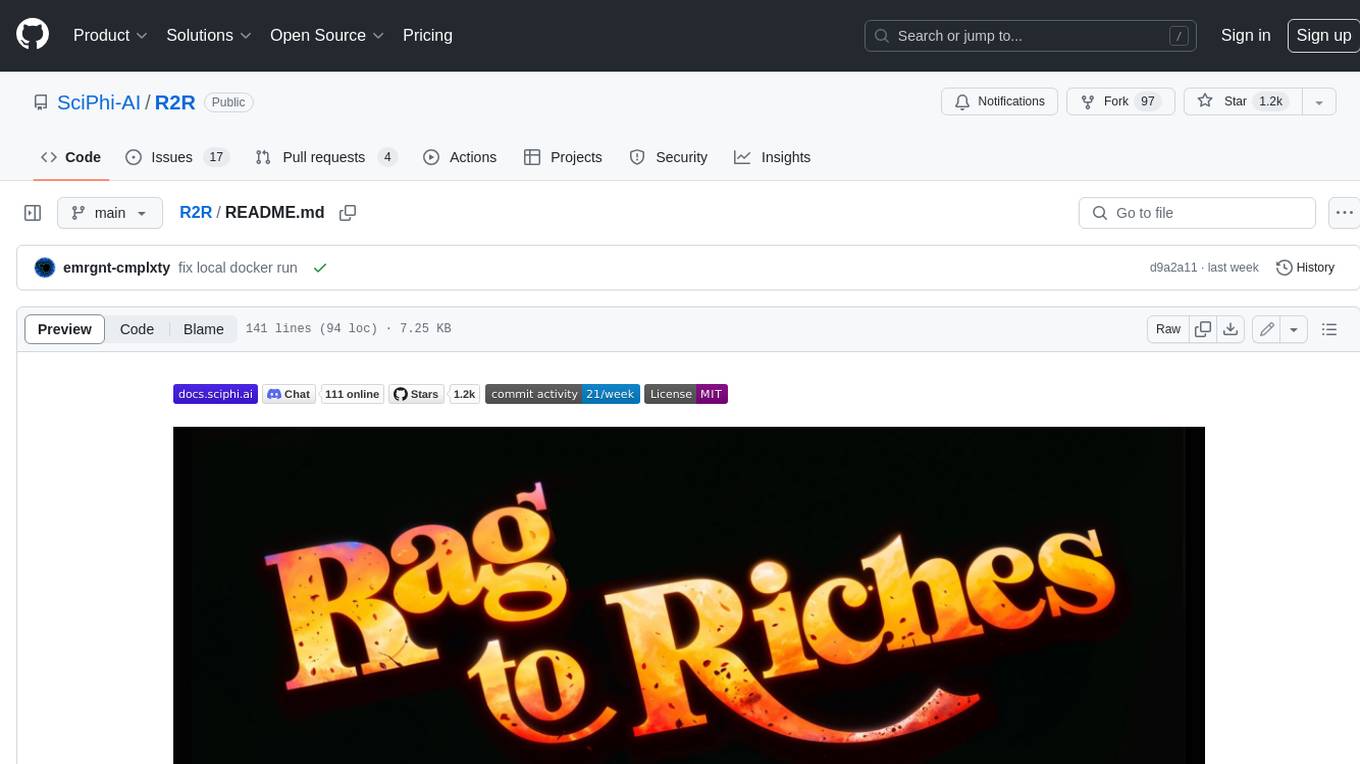
R2R
R2R (RAG to Riches) is a fast and efficient framework for serving high-quality Retrieval-Augmented Generation (RAG) to end users. The framework is designed with customizable pipelines and a feature-rich FastAPI implementation, enabling developers to quickly deploy and scale RAG-based applications. R2R was conceived to bridge the gap between local LLM experimentation and scalable production solutions. **R2R is to LangChain/LlamaIndex what NextJS is to React**. A JavaScript client for R2R deployments can be found here. ### Key Features * **🚀 Deploy** : Instantly launch production-ready RAG pipelines with streaming capabilities. * **🧩 Customize** : Tailor your pipeline with intuitive configuration files. * **🔌 Extend** : Enhance your pipeline with custom code integrations. * **⚖️ Autoscale** : Scale your pipeline effortlessly in the cloud using SciPhi. * **🤖 OSS** : Benefit from a framework developed by the open-source community, designed to simplify RAG deployment.
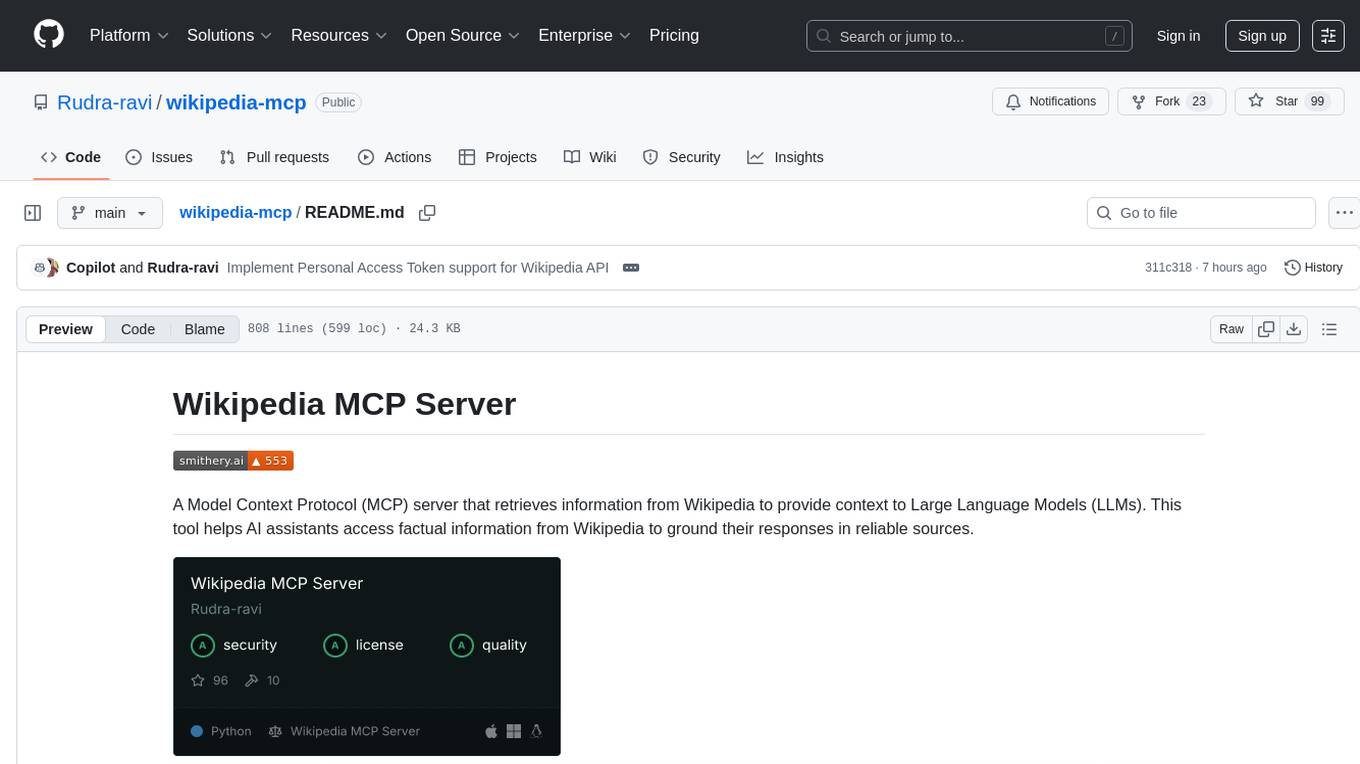
wikipedia-mcp
The Wikipedia MCP Server is a Model Context Protocol (MCP) server that provides real-time access to Wikipedia information for Large Language Models (LLMs). It allows AI assistants to retrieve accurate and up-to-date information from Wikipedia to enhance their responses. The server offers features such as searching Wikipedia, retrieving article content, getting article summaries, extracting specific sections, discovering links within articles, finding related topics, supporting multiple languages and country codes, optional caching for improved performance, and compatibility with Google ADK agents and other AI frameworks. Users can install the server using pipx, Smithery, PyPI, virtual environment, or from source. The server can be run with various options for transport protocol, language, country/locale, caching, access token, and more. It also supports Docker and Kubernetes deployment. The server provides MCP tools for interacting with Wikipedia, such as searching articles, getting article content, summaries, sections, links, coordinates, related topics, and extracting key facts. It also supports country/locale codes and language variants for languages like Chinese, Serbian, Kurdish, and Norwegian. The server includes example prompts for querying Wikipedia and provides MCP resources for interacting with Wikipedia through MCP endpoints. The project structure includes main packages, API implementation, core functionality, utility functions, and a comprehensive test suite for reliability and functionality testing.
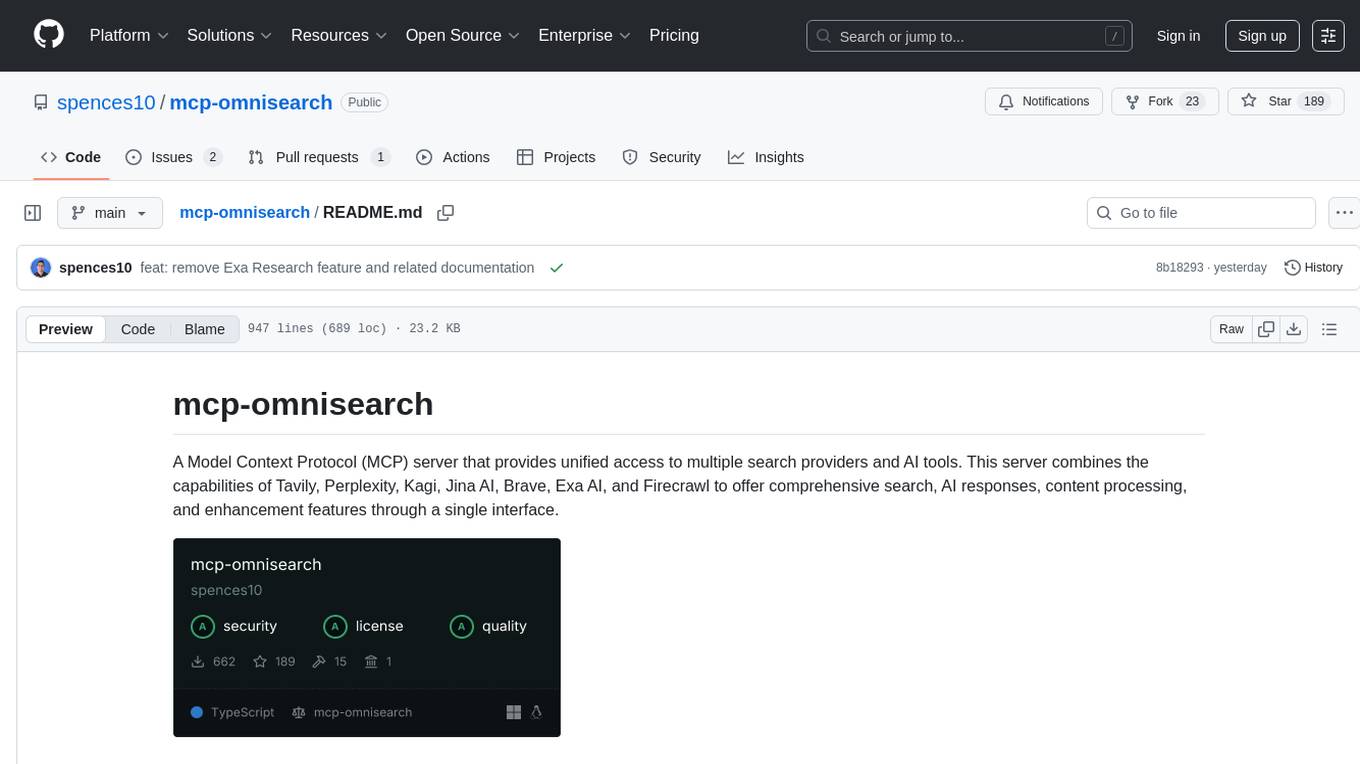
mcp-omnisearch
mcp-omnisearch is a Model Context Protocol (MCP) server that acts as a unified gateway to multiple search providers and AI tools. It integrates Tavily, Perplexity, Kagi, Jina AI, Brave, Exa AI, and Firecrawl to offer a wide range of search, AI response, content processing, and enhancement features through a single interface. The server provides powerful search capabilities, AI response generation, content extraction, summarization, web scraping, structured data extraction, and more. It is designed to work flexibly with the API keys available, enabling users to activate only the providers they have keys for and easily add more as needed.
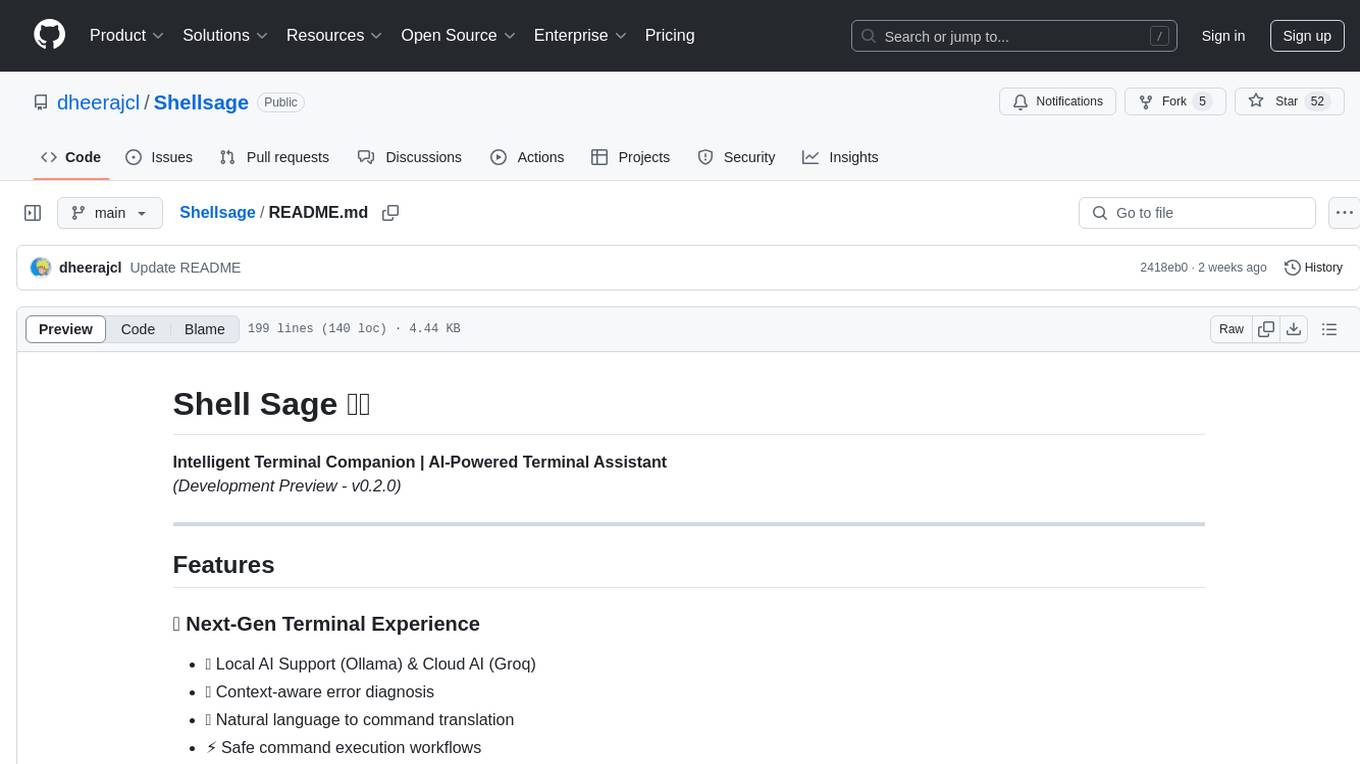
Shellsage
Shell Sage is an intelligent terminal companion and AI-powered terminal assistant that enhances the terminal experience with features like local and cloud AI support, context-aware error diagnosis, natural language to command translation, and safe command execution workflows. It offers interactive workflows, supports various API providers, and allows for custom model selection. Users can configure the tool for local or API mode, select specific models, and switch between modes easily. Currently in alpha development, Shell Sage has known limitations like limited Windows support and occasional false positives in error detection. The roadmap includes improvements like better context awareness, Windows PowerShell integration, Tmux integration, and CI/CD error pattern database.
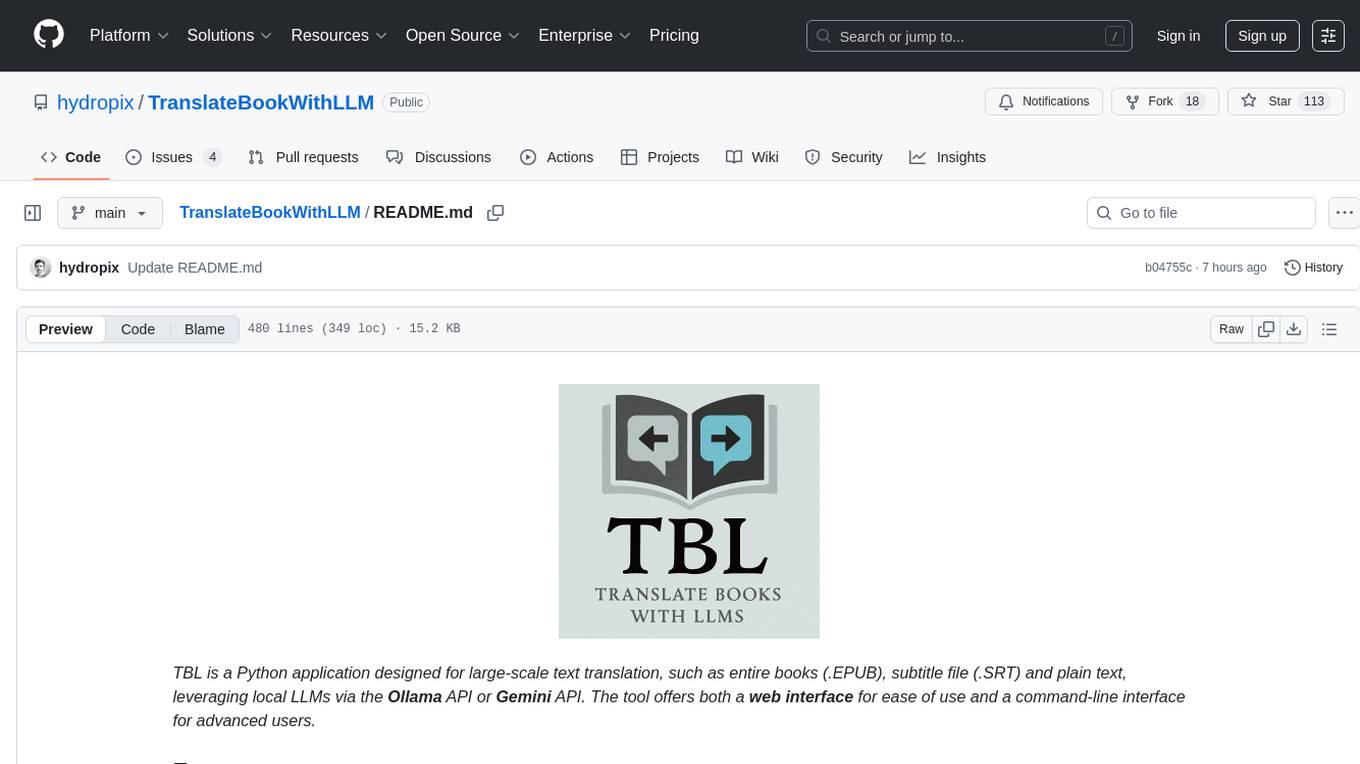
TranslateBookWithLLM
TranslateBookWithLLM is a Python application designed for large-scale text translation, such as entire books (.EPUB), subtitle files (.SRT), and plain text. It leverages local LLMs via the Ollama API or Gemini API. The tool offers both a web interface for ease of use and a command-line interface for advanced users. It supports multiple format translations, provides a user-friendly browser-based interface, CLI support for automation, multiple LLM providers including local Ollama models and Google Gemini API, and Docker support for easy deployment.
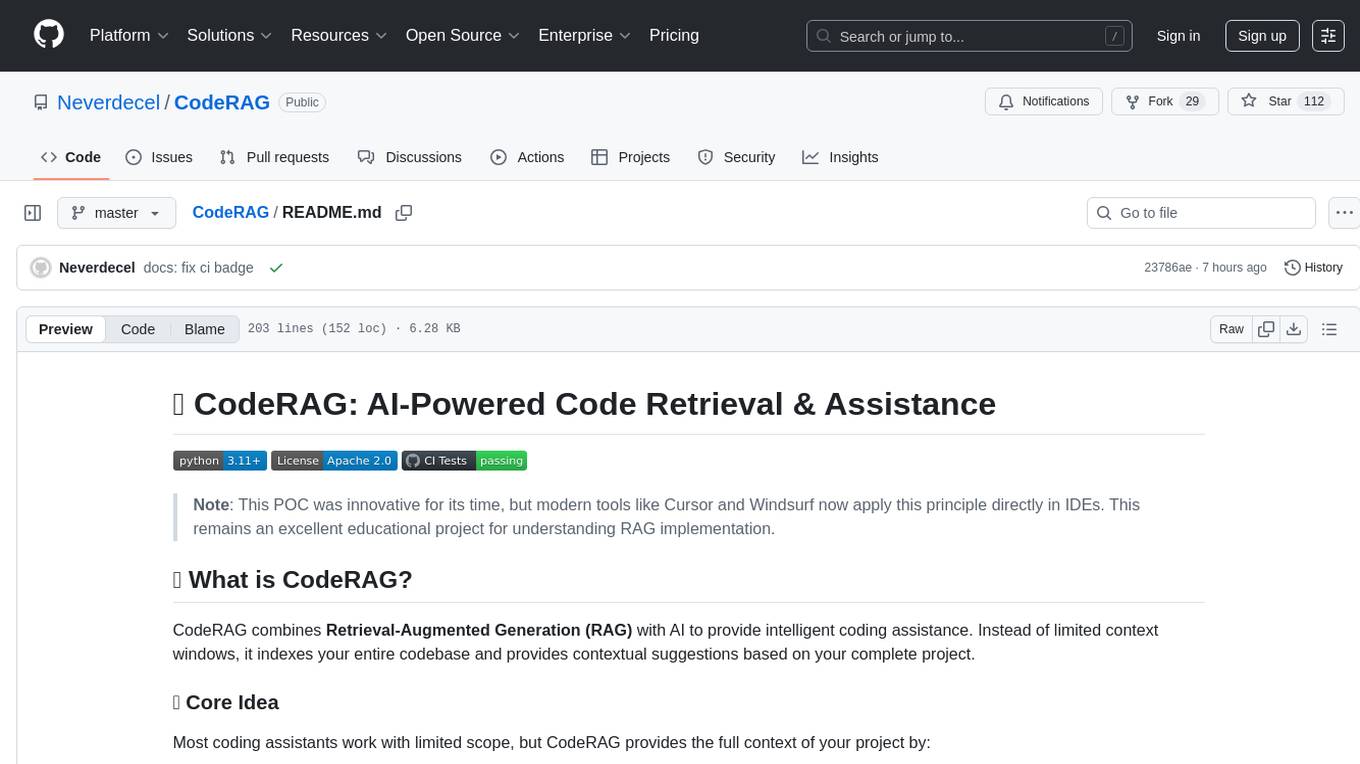
CodeRAG
CodeRAG is an AI-powered code retrieval and assistance tool that combines Retrieval-Augmented Generation (RAG) with AI to provide intelligent coding assistance. It indexes your entire codebase for contextual suggestions based on your complete project, offering real-time indexing, semantic code search, and contextual AI responses. The tool monitors your code directory, generates embeddings for Python files, stores them in a FAISS vector database, matches user queries against the code database, and sends retrieved code context to GPT models for intelligent responses. CodeRAG also features a Streamlit web interface with a chat-like experience for easy usage.
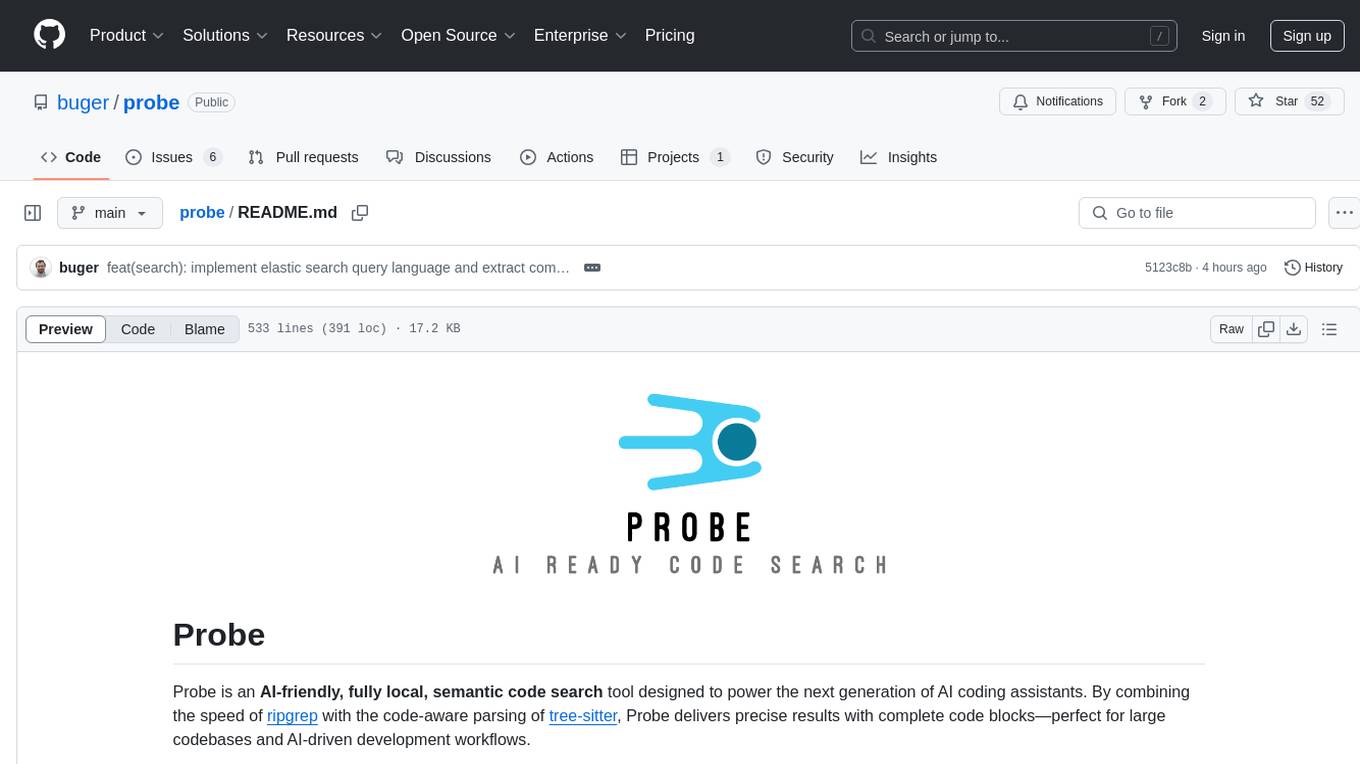
probe
Probe is an AI-friendly, fully local, semantic code search tool designed to power the next generation of AI coding assistants. It combines the speed of ripgrep with the code-aware parsing of tree-sitter to deliver precise results with complete code blocks, making it perfect for large codebases and AI-driven development workflows. Probe is fully local, keeping code on the user's machine without relying on external APIs. It supports multiple languages, offers various search options, and can be used in CLI mode, MCP server mode, AI chat mode, and web interface. The tool is designed to be flexible, fast, and accurate, providing developers and AI models with full context and relevant code blocks for efficient code exploration and understanding.
For similar tasks

zotero-mcp
Zotero MCP seamlessly connects your Zotero research library with AI assistants like ChatGPT and Claude via the Model Context Protocol. It offers AI-powered semantic search, access to library content, PDF annotation extraction, and easy updates. Users can search their library, analyze citations, and get summaries, making it ideal for research tasks. The tool supports multiple embedding models, intelligent search results, and flexible access methods for both local and remote collaboration. With advanced features like semantic search and PDF annotation extraction, Zotero MCP enhances research efficiency and organization.
For similar jobs
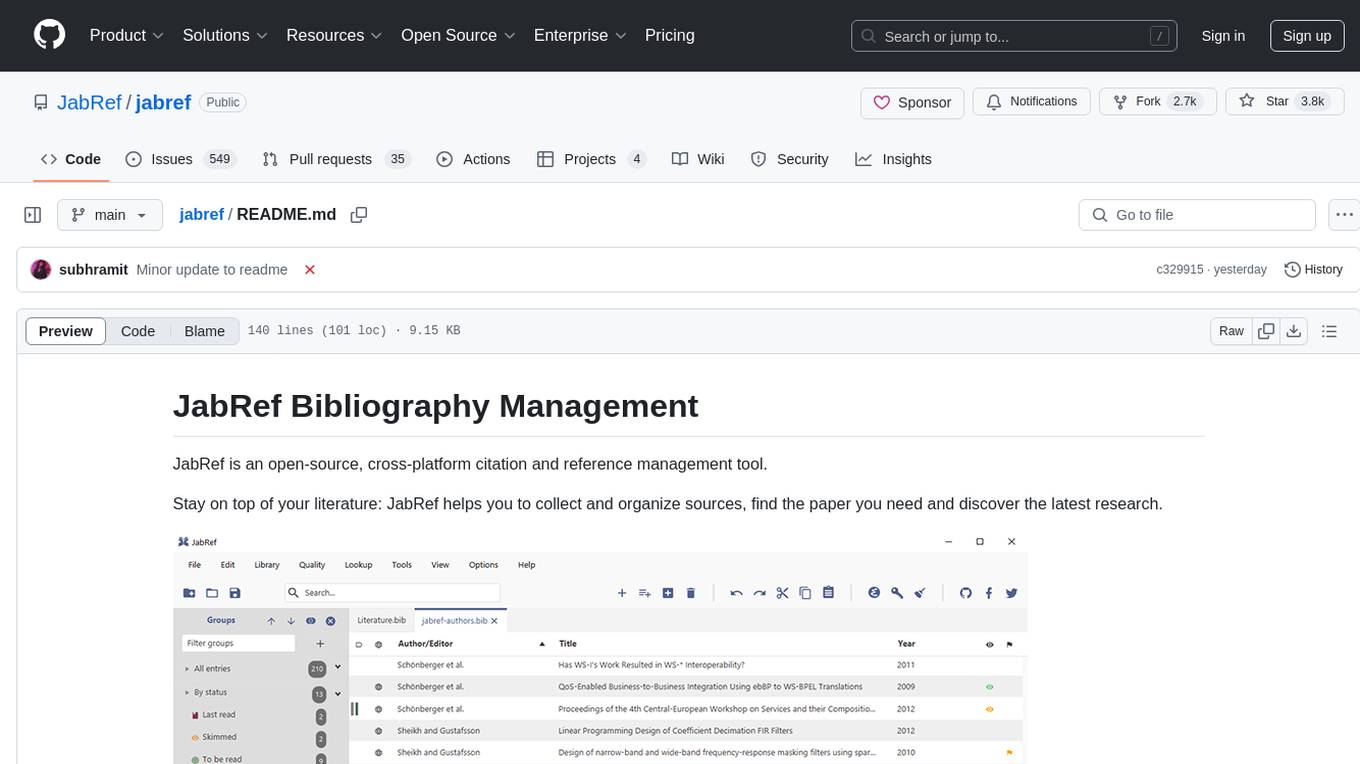
jabref
JabRef is an open-source, cross-platform citation and reference management tool that helps users collect, organize, cite, and share research sources. It offers features like searching across online scientific catalogues, importing references in various formats, extracting metadata from PDFs, customizable citation key generator, support for Word and LibreOffice/OpenOffice, and more. Users can organize their research items hierarchically, find and merge duplicates, attach related documents, and keep track of what they read. JabRef also supports sharing via various export options and syncs library contents in a team via a SQL database. It is actively developed, free of charge, and offers native BibTeX and Biblatex support.

zotero-mcp
Zotero MCP seamlessly connects your Zotero research library with AI assistants like ChatGPT and Claude via the Model Context Protocol. It offers AI-powered semantic search, access to library content, PDF annotation extraction, and easy updates. Users can search their library, analyze citations, and get summaries, making it ideal for research tasks. The tool supports multiple embedding models, intelligent search results, and flexible access methods for both local and remote collaboration. With advanced features like semantic search and PDF annotation extraction, Zotero MCP enhances research efficiency and organization.

ChatFAQ
ChatFAQ is an open-source comprehensive platform for creating a wide variety of chatbots: generic ones, business-trained, or even capable of redirecting requests to human operators. It includes a specialized NLP/NLG engine based on a RAG architecture and customized chat widgets, ensuring a tailored experience for users and avoiding vendor lock-in.

anything-llm
AnythingLLM is a full-stack application that enables you to turn any document, resource, or piece of content into context that any LLM can use as references during chatting. This application allows you to pick and choose which LLM or Vector Database you want to use as well as supporting multi-user management and permissions.

ai-guide
This guide is dedicated to Large Language Models (LLMs) that you can run on your home computer. It assumes your PC is a lower-end, non-gaming setup.

classifai
Supercharge WordPress Content Workflows and Engagement with Artificial Intelligence. Tap into leading cloud-based services like OpenAI, Microsoft Azure AI, Google Gemini and IBM Watson to augment your WordPress-powered websites. Publish content faster while improving SEO performance and increasing audience engagement. ClassifAI integrates Artificial Intelligence and Machine Learning technologies to lighten your workload and eliminate tedious tasks, giving you more time to create original content that matters.

mikupad
mikupad is a lightweight and efficient language model front-end powered by ReactJS, all packed into a single HTML file. Inspired by the likes of NovelAI, it provides a simple yet powerful interface for generating text with the help of various backends.

glide
Glide is a cloud-native LLM gateway that provides a unified REST API for accessing various large language models (LLMs) from different providers. It handles LLMOps tasks such as model failover, caching, key management, and more, making it easy to integrate LLMs into applications. Glide supports popular LLM providers like OpenAI, Anthropic, Azure OpenAI, AWS Bedrock (Titan), Cohere, Google Gemini, OctoML, and Ollama. It offers high availability, performance, and observability, and provides SDKs for Python and NodeJS to simplify integration.



